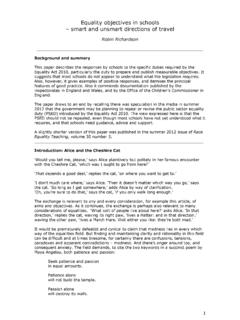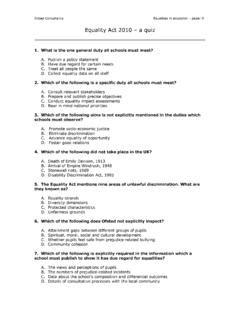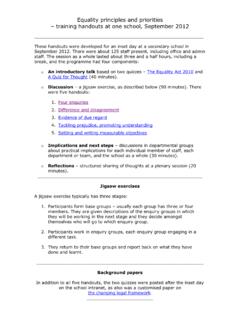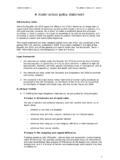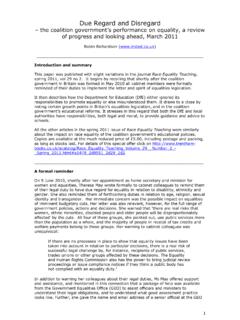Transcription of ‘Fundamental British Values’ Origins, controversy, ways ...
1 Fundamental British Values'. Origins, controversy , ways forward: a symposium Compiled by Robin Richardson and Bill Bolloten for Race Equality Teaching, January 2015. _____. One Friday recently My school, along with others,' wrote a headteacher in mid-November 2014, received notification one Friday recently of changes that were to come into force just three days later in the way we look after pupils' spiritual, moral, social and cultural development.'1 He continued: There had been a consultation over the summer holiday, but the sudden implementation left some of us feeling breathless. Governors must henceforth, we were told, ensure that schools actively promote the fundamental British values of democracy, the rule of law, individual liberty and mutual respect and tolerance of those with different faiths and beliefs'. At a time when the UK government is sending bombers to the Middle East, we had a weekend to think what the fundamental British values of democracy might actually be.
2 Are British values different from French or Swedish ones? How can governors really ascertain the level of our activity in promoting these values, whatever they might be? Can we look at values without seeing how these are translated into action? And should we really promote an unquestioning adherence to the rule of law? Many other headteachers and school governors in England asked similar questions, and voiced similar concerns, during the second half of 2014. So did many observers, academics, columnists and public intellectuals. This symposium in Race Equality Teaching, compiled at the end of 2014, recalls the circumstances in which the phrase fundamental British values' was introduced into public discourse, and the range of views that were expressed. Also, and even more importantly, it suggests various constructive ways ahead, bearing particularly in mind the duties which schools have under the Equality Act 2010.
3 It is intended to be of use to headteachers and school leaders, as they embark with colleagues and governors, and with pupils, their parents and wider society, in conversations about fundamental British values in their schools FBV for short. The structure of the symposium is as follows: 1 Origins Reminders that the term fundamental British values (FBV) entered policy discourse in 2011 as a component in Home Office deliberations about the nature and prevention of violent terrorism; entered then the world of education in 2011-12 with the publication of a statement about teachers'. standards which came into force in September 2012; and in 2014 became 1. well-known from 9 June onwards following a speech in the House of Commons by the then secretary of state for education in England, Michael Gove. 2 Criticism and controversy Reminders of the range of comment, criticism and concern that greeted the government's new plans and proposals for schools to actively promote FBV, and of the role played by FBV in the context of the government's controversial counter-terrorism strategy.
4 3 Ways forward Principles for moving forward from confusion and controversy , including discussion of the requirement to promote pupils' spiritual, moral, social and cultural(SMSC) development, and the need for national and local conversations, as distinct from top-down directives from government. 1 ORIGINS. Much of the comment in the press about FBV in summer 2014 seemed to assume the term had only just entered public discourse and that the context for its use was essentially educational. In point of fact the term was coined in 2011. and the original context had nothing directly to do with education, for it occurred within a definition of extremism formulated by the Home The purpose of the definition was to explain how the Home Office would decide in future whether or not to talk to, work with and fund certain organisations and individuals, particularly in its relationships with Muslim groups and communities.
5 It was based on the theory that the root cause of terrorist acts perpetrated by people of Muslim heritage is the ideology or narrative known as islamism . The theory is plausible to some but as recalled later in this symposium is considered simplistic, insufficient and counter-productive by others. The Home Secretary wrote: We will respond to the ideological challenge of terrorism and the threat from those who promote it. In doing so, we must be clear: the ideology of extremism and terrorism is the problem; legitimate religious belief emphatically is not. But we will not work with extremist organisations that oppose our values of universal human rights, equality before the law, democracy and full participation in our society. If organisations do not accept these fundamental values, we will not work with them and we will not fund To elaborate on this intention, the Home Office provided a definition of extremism.
6 It appeared in full in a glossary appended to a policy document containing more than 100 pages, and in a shortened form in a footnote in the main body of the document. The full version in the appendix was this: Extremism is vocal or active opposition to fundamental British values, including democracy, the rule of law, individual liberty and mutual respect and tolerance of different faiths and beliefs. We also include in our definition of extremism calls for the death of members of our armed forces, whether in this country or overseas. The Home Office sees extremism, as thus defined, as a component and consequence of what it refers to as the Al Qa'ida narrative or global extremist narrative and which it summarises with these words: 2. the particular interpretation of religion, history and politics that is associated with Al Qa'ida and like minded groups. The narrative connects grievances' at a local and/or global level, reinforces the portrayal of Muslims as victims of Western injustice and thereby purports to legitimise terrorism.
7 It combines fact, fiction, emotion and religion and manipulates discontent about local and international The Home Office definition of extremism was conceptually unclear, since its key terms rule of law', liberty', democracy', tolerance' are open to conflicting interpretations, and over the years have had different meanings at different times and in different contexts. None of them refers to an absolute value . The lack of conceptual clarity was compounded by the unclear punctuation, for the reader could not know whether liberty' and mutual respect' were joined with the word and', or whether liberty' and tolerance' were, or whether three separate values were being listed a) liberty b) mutual respect and c) tolerance. But these deficiencies were arguably unimportant in view of the Home Office's essential purpose. If its terminology were challenged, courts of law would lay down interpretations.
8 Conceptual and grammatical clarity is, however, required when the professional careers of teachers are under consideration, and the reputation and good standing of schools, and the education received by children. In retrospect, it can be seen that the Home Office's choice of the term FBV was most unfortunate. The phrasing ought to have been something like the fundamental values and principles which underlie public life in the United Kingdom'. A formulation such as this would have achieved the Home Office's aims. Further, and in the current context more importantly, if such a formulation had been adopted by the Department for Education, much confusion, anxiety and stress in schools would have been avoided. Also much stress and uncertainty would have been avoided if, before engaging in confused and confusing talk about British values, the DfE had had due regard for its public sector equality duty to think about eliminating discrimination, and about advancing equality of opportunity, and about fostering good relations.
9 Teachers' standards In 2012 the Department for Education adopted some of the phrases in the Home Office definition of extremism as a basis for establishing the standards required of professional teachers. A teacher is expected,' the DfE said, to demonstrate consistently high standards of personal and professional conduct'. It then provided three statements defining the behaviour and attitudes which set the required standard for conduct throughout a teacher's career', the first of which was Teachers uphold public trust in the profession and maintain high standards of ethics and behaviour, within and outside school, by .' There then followed five bullet points, the fourth of which was: o not undermining fundamental British values, including democracy, the rule of law, individual liberty and mutual respect, and tolerance of those with different faiths and beliefs5.
10 The punctuation in the original formulation had been tidied up with the addition of a comma after respect, and the phrase tolerance of different faiths and beliefs' had been expanded to' tolerance of those [italics added] with different 3. faiths and beliefs'. The comma was a useful clarification, though was not widely adopted in other government publications. But the other change still left questions unanswered. Different' from what? What are the limits of tolerance, and who decides? Why was the original wording about tolerance changed? Statements about teachers' standards had been first issued in 1984, and had then appeared again in 1989 and 1992 under the Conservative government and in 1997, 2002 and 2007 under Labour. It was not until 2011/12, however, that the term FBV was used. The 2012 document became well-known in teacher training institutions but it was not until 2014 that the term British values began to be well-known in contexts associated with schools.
